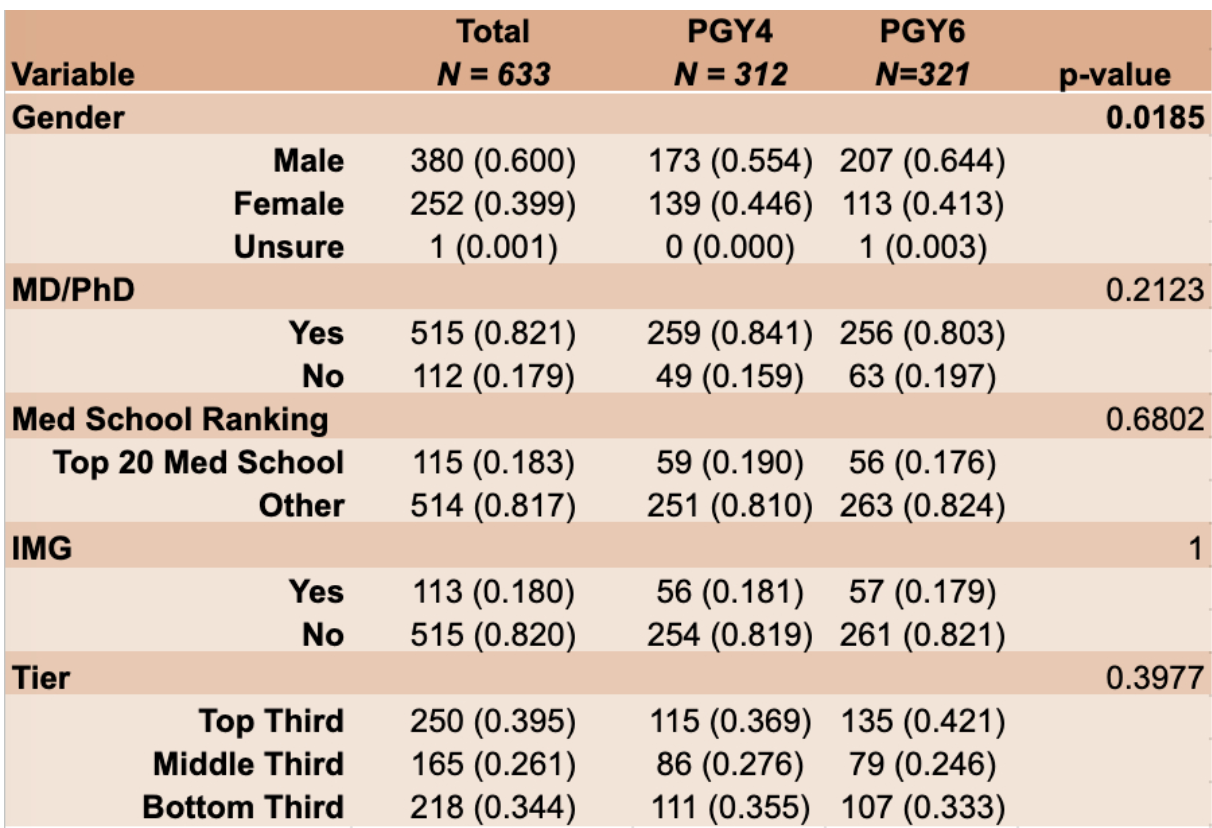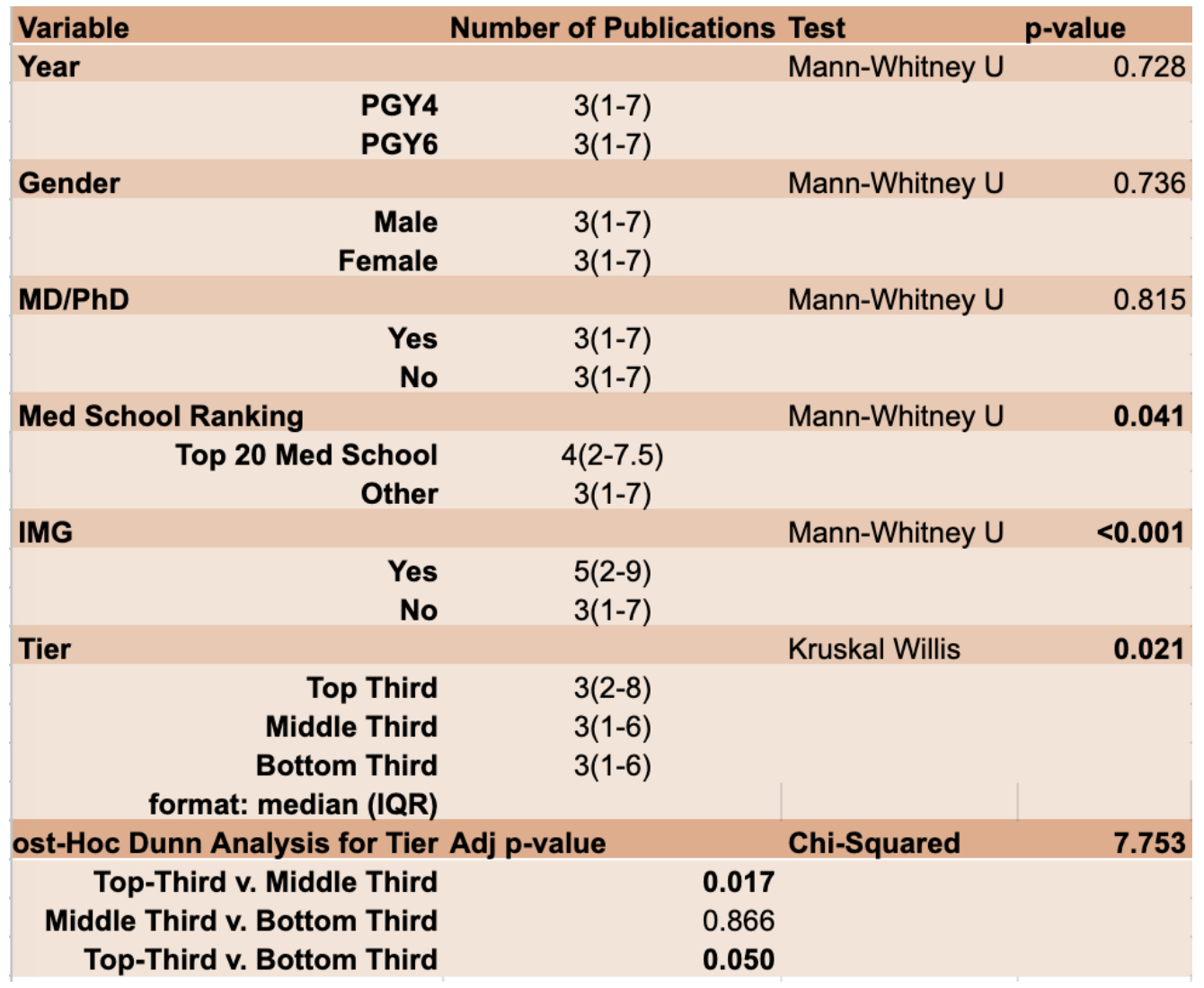Tuesday Poster Session
Category: Practice Management
P6168 - Gender and Academic Productivity Trends Among GI Fellows: An Analysis of Training and Publication Metrics
Tuesday, October 28, 2025
10:30 AM - 4:00 PM PDT
Location: Exhibit Hall

Thomas Stirrat, BS (he/him/his)
Georgetown University School of Medicine
Third Lake, IL
Presenting Author(s)
Thomas Stirrat, BS1, Deeptha Bejugam, BS2, Shankar S. Thiru, BS3, Anurag Paul, BS3, Joseph Atarere, MD4, Zachariah Foda, MD, PhD5, Priyanka Kanth, MD6
1Georgetown University School of Medicine, Third Lake, IL; 2Georgetown University School of Medicine, McLean, VA; 3Georgetown University School of Medicine, Washington, DC; 4MedStar Georgetown University Hospital, Baltimore, MD; 5Johns Hopkins University School of Medicine, Baltimore, MD; 6MedStar Georgetown University Hospital, Washington, DC
Introduction: This study examines gender and academic productivity disparities among gastroenterology (GI) fellows, focusing on publication metrics and training program characteristics. Understanding these patterns is essential for addressing equity in academic medicine.
Methods: A retrospective analysis was conducted on 633 GI fellows (380 men, 252 women) across PGY4 and PGY6 cohorts. Baseline differences in gender, training characteristics, and publication metrics were evaluated. Statistical comparisons included Fisher’s Exact, Mann-Whitney U, and Kruskal-Wallis tests, with post-hoc Dunn’s analyses for significant results. Academic productivity was assessed via PubMed-indexed publications, including first- and last-author roles and GI-specific articles.
Results: Fellows had a median of three total PubMed-indexed publications (IQR: 1–7). Gender disparities were notable, with the PGY6 cohort showing a higher proportion of males compared to PGY4 (64.4% vs. 55.4%, p = 0.019). Fellows from top 20 medical schools had higher publication medians (4, IQR: 2–7.5) compared to peers from other schools (3, IQR: 1–7, p = 0.041). International medical graduates (IMGs) had significantly more total (median: 4, IQR: 2–9, p < 0.001) and GI-specific publications (median: 2, IQR: 1–6, p = 0.003) compared to non-IMGs. Academic productivity also varied by training program tier, with top-tier programs yielding higher publication numbers compared to lower tiers.
Discussion: Gender disparities persist in advanced training stages, with male fellows comprising a larger proportion in senior cohorts. Academic productivity is influenced by educational background and training program prestige, highlighting systemic inequities. IMGs demonstrated higher publication productivity, reflecting unique challenges and achievements in academic medicine.
Addressing disparities in gender representation and academic productivity among GI fellows requires targeted interventions, including equitable mentorship and resources. Supporting diversity in training programs can foster inclusive academic excellence in gastroenterology.

Figure: Figure 1. Baseline demographics of PGY-4 (n = 312) and PGY-6 (n = 321) gastroenterology fellows: counts (proportions) are shown, with a significantly higher male-to-female ratio in PGY-6 (P = 0.0185); no other variable differed between cohorts.

Figure: Figure 2. Median (IQR) PubMed-indexed publication counts by trainee characteristics using Mann-Whitney U or Kruskal–Wallis tests reveal greater output among top-20 medical-school graduates, international medical graduates, and fellows in top-tier programs, with significant pair-wise differences confirmed by Dunn post-hoc analysis (adjusted P < 0.05).
Disclosures:
Thomas Stirrat indicated no relevant financial relationships.
Deeptha Bejugam indicated no relevant financial relationships.
Shankar Thiru indicated no relevant financial relationships.
Anurag Paul indicated no relevant financial relationships.
Joseph Atarere indicated no relevant financial relationships.
Zachariah Foda: Delfi Diagnostics – Consultant, Intellectual Property/Patents, Royalties.
Priyanka Kanth indicated no relevant financial relationships.
Thomas Stirrat, BS1, Deeptha Bejugam, BS2, Shankar S. Thiru, BS3, Anurag Paul, BS3, Joseph Atarere, MD4, Zachariah Foda, MD, PhD5, Priyanka Kanth, MD6. P6168 - Gender and Academic Productivity Trends Among GI Fellows: An Analysis of Training and Publication Metrics, ACG 2025 Annual Scientific Meeting Abstracts. Phoenix, AZ: American College of Gastroenterology.
1Georgetown University School of Medicine, Third Lake, IL; 2Georgetown University School of Medicine, McLean, VA; 3Georgetown University School of Medicine, Washington, DC; 4MedStar Georgetown University Hospital, Baltimore, MD; 5Johns Hopkins University School of Medicine, Baltimore, MD; 6MedStar Georgetown University Hospital, Washington, DC
Introduction: This study examines gender and academic productivity disparities among gastroenterology (GI) fellows, focusing on publication metrics and training program characteristics. Understanding these patterns is essential for addressing equity in academic medicine.
Methods: A retrospective analysis was conducted on 633 GI fellows (380 men, 252 women) across PGY4 and PGY6 cohorts. Baseline differences in gender, training characteristics, and publication metrics were evaluated. Statistical comparisons included Fisher’s Exact, Mann-Whitney U, and Kruskal-Wallis tests, with post-hoc Dunn’s analyses for significant results. Academic productivity was assessed via PubMed-indexed publications, including first- and last-author roles and GI-specific articles.
Results: Fellows had a median of three total PubMed-indexed publications (IQR: 1–7). Gender disparities were notable, with the PGY6 cohort showing a higher proportion of males compared to PGY4 (64.4% vs. 55.4%, p = 0.019). Fellows from top 20 medical schools had higher publication medians (4, IQR: 2–7.5) compared to peers from other schools (3, IQR: 1–7, p = 0.041). International medical graduates (IMGs) had significantly more total (median: 4, IQR: 2–9, p < 0.001) and GI-specific publications (median: 2, IQR: 1–6, p = 0.003) compared to non-IMGs. Academic productivity also varied by training program tier, with top-tier programs yielding higher publication numbers compared to lower tiers.
Discussion: Gender disparities persist in advanced training stages, with male fellows comprising a larger proportion in senior cohorts. Academic productivity is influenced by educational background and training program prestige, highlighting systemic inequities. IMGs demonstrated higher publication productivity, reflecting unique challenges and achievements in academic medicine.
Addressing disparities in gender representation and academic productivity among GI fellows requires targeted interventions, including equitable mentorship and resources. Supporting diversity in training programs can foster inclusive academic excellence in gastroenterology.

Figure: Figure 1. Baseline demographics of PGY-4 (n = 312) and PGY-6 (n = 321) gastroenterology fellows: counts (proportions) are shown, with a significantly higher male-to-female ratio in PGY-6 (P = 0.0185); no other variable differed between cohorts.

Figure: Figure 2. Median (IQR) PubMed-indexed publication counts by trainee characteristics using Mann-Whitney U or Kruskal–Wallis tests reveal greater output among top-20 medical-school graduates, international medical graduates, and fellows in top-tier programs, with significant pair-wise differences confirmed by Dunn post-hoc analysis (adjusted P < 0.05).
Disclosures:
Thomas Stirrat indicated no relevant financial relationships.
Deeptha Bejugam indicated no relevant financial relationships.
Shankar Thiru indicated no relevant financial relationships.
Anurag Paul indicated no relevant financial relationships.
Joseph Atarere indicated no relevant financial relationships.
Zachariah Foda: Delfi Diagnostics – Consultant, Intellectual Property/Patents, Royalties.
Priyanka Kanth indicated no relevant financial relationships.
Thomas Stirrat, BS1, Deeptha Bejugam, BS2, Shankar S. Thiru, BS3, Anurag Paul, BS3, Joseph Atarere, MD4, Zachariah Foda, MD, PhD5, Priyanka Kanth, MD6. P6168 - Gender and Academic Productivity Trends Among GI Fellows: An Analysis of Training and Publication Metrics, ACG 2025 Annual Scientific Meeting Abstracts. Phoenix, AZ: American College of Gastroenterology.
